“Life”, by the Dutch director Anton Corbijn, is a film about James Dean’s tempestuous life, offering us a touching insight into his experience as an orphan.
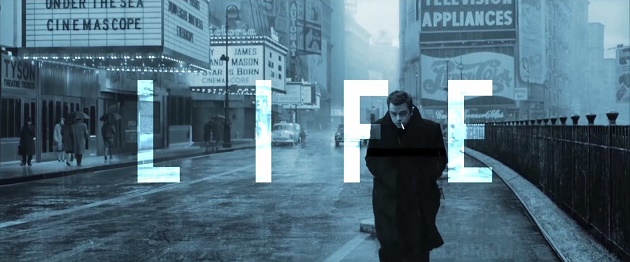 Anton Corbijn's movie refers both to the magazine and to Dean's experience.
Anton Corbijn's movie refers both to the magazine and to Dean's experience.
“We must get home! / How could we stray like this? / So far from home / We know not where it is”, these are the verses by James Whitcomb Riley (1849-1916), read by the character of James Dean, that bring the film by the Dutch photographer Anton Corbijn to a close. “Life” is both the name of the magazine that, shortly before the actor’s death, published the photographs that turned him into a legend, and life itself.
The story begins with the meeting between the star of “Rebel without a cause” (1955) and the photographer Dennis Stock, at a party given by the Director Nicholas Ray in LA, at which the young Natalie Wood is also present. Throughout the story, we do not know whether the authoritarian producer Jack Warner will tolerate the insolence displayed by Dean, who went so far as to miss the premier of Elia Kazan’s “East of Eden” (1955), based on the novel by Steinbeck. The actor shows himself to be as voluble and lost as in the three films that he acted in, prior to the tragic accident in which he died.
“Life” is a touching description of life as an orphan, growing in intensity from the moment that Dean and the photographer travel to visit his family in snowy Indiana, where he grew up with his aunt and uncle, after the death of his mother. First they take the famous photograph of the actor on a rainy New York morning in Times Square, known as “Boulevard of Broken Dreams”. Both that, and the photograph of him playing with his cousin, mending a car or reading comics out loud, were taken by Stock at times when he had tired of Dean’s tantrums.
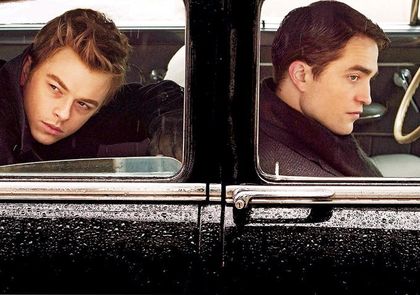 James Dean, starred by Dane DeHaan, and actor Robert Pattison, the photographer Dennis Stock.
James Dean, starred by Dane DeHaan, and actor Robert Pattison, the photographer Dennis Stock.The photographer is also a young man who has lost his way in life and who, since his divorce, does not know how to relate to his son, in the face of the continuous reproaches of his ex-wife. The image of them both, sitting lost on a bench in snowy Central Park is so pathetic that it makes you want to cry. Frustration and powerlessness dominates the life of two people without direction and who have lost their sense of purpose.
EVANGELICAL EDUCATION
As we are told in the film, Dean’s uncle and aunt are Quakers. Although he attended its meetings in Back Creek, on the border of Fairmont, some people mistake the congregation with another one in the village, the pastor of which had a very hippy appearance and presided over his funeral along with James DeWeerd, the minister and Dean’s confidant.
The evangelical tradition in which the actor grew up is linked to the holiness movement that we associate with Wesleyan spirituality – this does not just concern Methodists, but any type of denomination, including the Quakers, which embraces the missionary idea of the Salvation Army, Hudson Taylor’s mission to China, or the devotional meditations of the Canadian Oswald Chambers–.
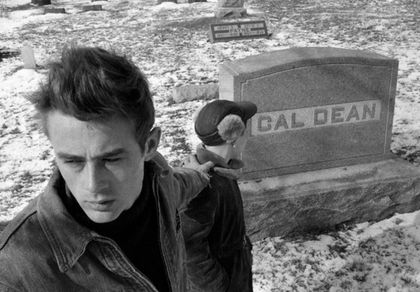 Dean and his cousin Markie, next to the tomb of his grandfather Cal.
Dean and his cousin Markie, next to the tomb of his grandfather Cal. DeWeerd is the minister that Elizabeth Taylor claimed had abused Dean when he was a boy. He was not the pastor at his church, as some people believe. The couple who led his church were missionaries in a holiness movement called World Gospel Mission, which had its base in the nearby town of Marion. DeWeerd was a member of that church. He had grown up in Fairmont, the son of missionaries to Sierra Leone. He lived with his mother and worked as a minister in the congregation, having been a chaplain in the second world war, sustaining an injury to the chest during his posting in France.
He was Dean’s main influence during his time at secondary school. He was not a typical evangelical preacher. He was into motor racing, Mexican bull fighting, poetry and theatre. He is thought to have been a freemason, which did not add up with the holiness movement. He bragged about having met Churchill and of having attended the funeral of the Queen of England. He was eloquent and extravagant. He became the pastor of an independent holiness church, the Cadle Tabernacle in Indianapolis. He directed a bible school in the same movement, Kletzing College in Iowa, and edited an important magazine in that same line, The Christian Witness (1870 – 1959).
ABUSED BY A PASTOR
The minister gave Dean an education. He took him to car races – it was in going to a race in Salinas, near San Francisco, that he died–. Moreover, it was the pastor who taught him how to drive. When he invited him mover for dinner, he would read him poetry and give him spiritual advice. He would show him his films of bullfighting in Mexico, where he would visit him even when he was in Hollywood. He preached at his funeral at the Park cemetery, where he is also buried, next to him.
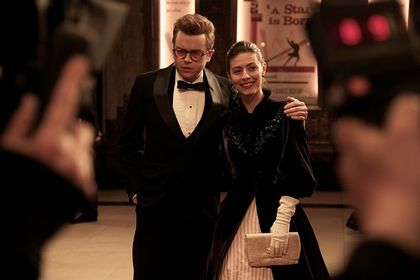 James Dean had a relationship with Italian actress Pier Angeli. In her suicide letter, she said he was the love of her life.
James Dean had a relationship with Italian actress Pier Angeli. In her suicide letter, she said he was the love of her life.His sexual abuse seems to have been one of the factors that led to Dean’s bisexuality. In the film, we see his disappointment when the Italian actress Pier Angeli breaks up with him to marry the singer Vic Damone. He found out about it during a press conference. She agreed to the marriage under pressure from her mother, who did not approve of Dean’s character, his way of dressing and in particular the fact that he was not a catholic. Dean went to the church door, while the ceremony was under way, and revved up his motorbike to make noise. Her marriage did not last long and she eventually committed suicide by taking an overdose in 1971. She left a note saying that Dean had been the love of her life.
In Hyams’ biography of the actor, he describes how he was abused when the minister offered to comfort him. He bases this on a testimony given by the minister, not long after Dean’s death, which was not published until 1992. Given that, at that time, he was the pastor of Cadle Tabernacle, it is difficult to imagine that he would put his ministry in danger by making such revelations. However, there are rumours about his homosexuality: he married late, but people said that he would look at young boys swimming naked at the Anderson YMCA. We don’t know how far he went in his physical relationship with Dean. John Gilmore claims that Dean prostituted himself on Santa Monica Boulevard, giving Hollywood magnates sexual favours. However, others have described his as strangely asexual, so who knows?
NOSTALGIA FOR A LOST HOME
“We must get home again--we must--we must!/ Our rainy faces pelted in the dust/ Creep back from the vain quest through endless strife/To find not anywhere in all of life”. These are the continuation of the verses read by the actor at the end of the film.
Who hasn’t had that feeling of disconnection? The feeling of being out of place everywhere. The feeling of being an orphan is not only the legacy of those of us who have lost our mothers early. It is the experience of men like C.S. Lewis, who conclude that if we do not find our home in this world, it must be in another. That desire exists because, in some way, it can be satisfied.
The author of the Chronicles of Narnia says that “If we find ourselves with a desire that nothing in this world can satisfy, the most probable explanation is that we were made for another world.”. There is a life that we have not yet experienced and it is in the home of the Father who receives us with open arms, after so much wandering, that we find his prodigal love (Luke 15). He has provided the lamb for the feast, because he who was lost, has finally been found… we need to get home again!
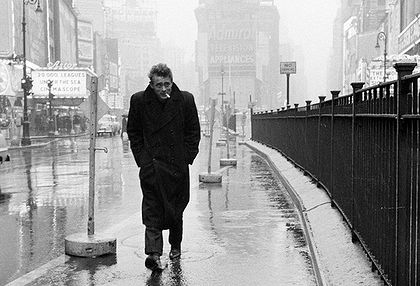 James Dean, a rainy day at Times Square in New York.
James Dean, a rainy day at Times Square in New York.
Las opiniones vertidas por nuestros colaboradores se realizan a nivel personal, pudiendo coincidir o no con la postura de la dirección de Protestante Digital.
Si quieres comentar o